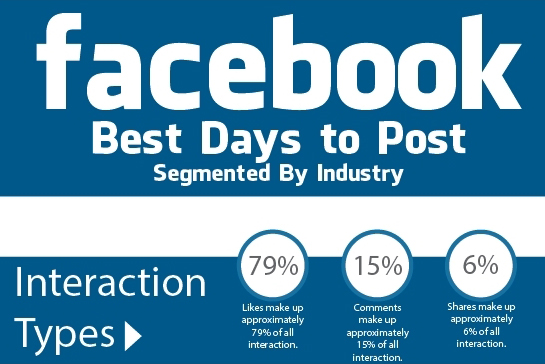|
A new report looks at 15 business fields to determine the best day of the week to share content on Facebook for engagement.
Click to view industry:
0 Comments
If you’re building your business brand in today’s marketplace, you need to stand head and shoulders above the crowd of other businesses competing for your customers’ attention.
Furthermore, you need to track how effective your brand building is, by monitoring it closely and reacting accordingly. Your brand could well be your most valuable business asset and can mean the difference between a lifetime of loyal and avid customers, or simply being lost in the crowd of other brand marketers on Facebook and Twitter. Let’s look at five ways for you to measure and track your brand in today’s online world. 1. Are Your Fans Engaging With You? Social media and the internet has changed the way we do business. Gone are the days when you marketed to your customers. These days marketing is a two way conversation, with social engagement taking place between the business and consumers. Relationships are built by being responsive to your customers needs. A great example of fan engagement is the French telecommunications company, Orange, who used Twitter to engage their fans. Followers were asked to use the hashtag #thissummer to tweet about the plans they had for summer, which were then broadcast on Orange's blog, with a Voice Over. This had the twofold effect of both creating massive traffic, and enabling people to identify with Orange around an interesting and enjoyable topic. 2. How Much Real Value Are you Adding To The Conversation? The content you offer needs to be the sort that people enjoy and encourages them to share with others, just like Healthy Choice did. They increased engagement with their followers, and gained an extra 10,000 fans by offering a low value Facebook coupon, which increased in value as their fan base grew. This not only reinforced their brand image with existing customers, but the majority of new fans also subscribed to their newsletter. 3. Are You Trying To Take More Than You're Giving? Social media is about building a loyal and responsive following, by giving often, and taking infrequently. Think of it as a savings account. You must put in regular deposits, so you can reap the benefits when you need to make a withdrawal. Giving freely without asking for something in return will translate to massive positive response from your fans when you do decide to ask for something. 4. Are You Actually Listening To The Online Conversation? Today’s customer is a powerful being, with the ability to impact your business in a matter of minutes. It’s therefore essential that you’re listening to the conversation that’s going on all around you, so you can respond to any negativity before it wreaks havoc with your business. Learn from U-Haul’s mistake, who suffered long term damage to their well established brand, as well as lost thousands of dollars, because of a negative conversation about them which they weren’t listening to. Even negative feedback can turn into a positive experience because it shows others that you’re concerned and responsive to their issues. 5. Is Your Website Active With Engagement, or Is It Silent And Stagnant? Just having a website, no matter how flashy or attractive you think it is, simply isn’t enough anymore. Build it and they will come is an internet myth. Customers want to visit websites and blogs on which they can find interesting and engaging information, and which they want to bookmark and return to often because they look forward to your new content. A simple way to encourage your website visitors to engage with you is to end your articles and blog posts with a question that encourages the reader to respond. What do you want most out of your marketing efforts? Ask yourself these questions:
If you can imagine yourself thumbing through an old card catalog system at your local library, you'd find that there is a certain quality to the system. Every book is cataloged according to a numerical system called the Library of Congress cataloging system. And you see all the same basic information with every listing. It's designed that way on purpose.
While the Internet is certainly not your public library (and much of the information you find online is suspect), in terms of finding the information that you want to find, there is a quality system built into the search engines where people go to search for information. Each search engine has its own quality guidelines, but the leading search engine - Google - sets the standard. You can learn more about Google's quality guidelines on its website. Bing, the No. 2 search engine online, also has its quality guidelines. Note that they're not a great deal different than Google's. While there are similarities to the quality guidelines, there are also subtle differences. That's why website owners will often find their web pages doing well in one search engine while not doing so well in others. But you also have to consider the level of competition. For almost any niche there is quite a bit more competition for Google search rankings than for search rankings at any other search engine - even at Bing. So what should you make of this? As the owner of a business who is trying to get your web pages to rank for your key terms, it's important to know the search engine guidelines and to abide by them. There are penalties if you do certain things wrong. And the rewards for doing all the right things right include higher rankings, more targeted traffic to your website, and more revenues from good landing pages that close the sale. |
Archives
June 2024
Categories
All
|
Website Design Gettysburg | Services | Website Designer Near Me | Prices | Contact Gettysburg Website Design | Design Blog
From Our Blog
3 Steps to Improve Your Google Business Listing Ranking • Search Engine Optimization + GMB = More Leads & Sales! • Website SEO Checklist
Secrets To Building an Appealing Website For Any Niche
Secrets To Building an Appealing Website For Any Niche
|
Crawford Designs, LLC
Gettysburg Website Design |
© 2021 Gettysburg Website Design.
717-855-3184 |
SERVICES: Website Design, Local Gettysburg Website Design Services, Website Design Company, Website Development Company, Freelance Web Designer, Web Design Company, Web Development Company, Business Websites, Corporate Websites, Business Marketing and Advertising. Website Maker, Web Site Creator, Web Builder, Done For You Websites, Hire a Website Designer, How to Get a Business Website, best website design companies for small business, website design pa, website for small business owners, web design and marketing company, top website design company, york county web design, local web design companies near me, small business web design near me, web design westminster md, web designers in hanover pa, small design companies




 RSS Feed
RSS Feed

